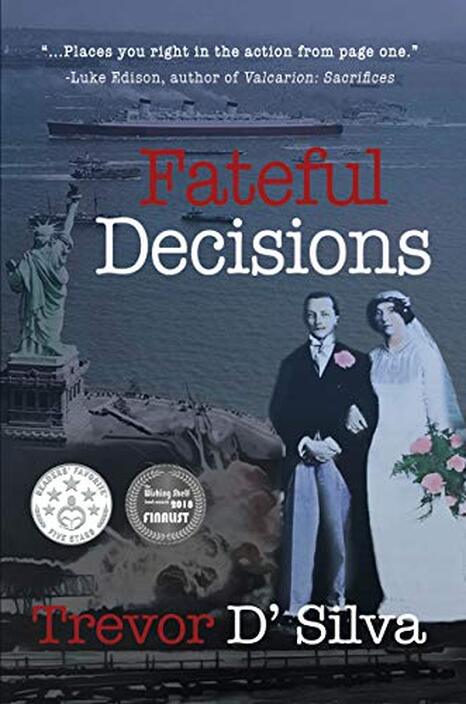|
book reviews |
|
Award winning author, Trevor D’Silva introduces us to his novel, “Fateful Decisions”: A Wishing Shelf Book Award Finalist 2018 It’s 1915 in the heat of WWI. Two friends heading to England aboard the British ocean liner, RMS Lusitania, meet and fall in love with a charismatic woman. After battling for her affection, Rachel Williams makes her decision, beginning a journey that no one can predict or soon forget. For the next thirty years, Rachel is forced to live with the choice she made, as the dominos fall around her, sequentially. Is there a sinister force at work? Who can Rachel trust? Will Rachel ultimately regret her decision when she learns how it impacted others? Set in America and Europe, history and fiction intertwine, commencing with the sinking of Lusitania. Historical events like The Russian Revolution, Prohibition, The Great Depression and World Wars I and II also play important roles in the lives of the characters and the decisions they make to love, betray, forgive, and reconcile. At first, it seemed to be very plainly written, almost simple. After a few dozen pages I began to enjoy the genius of the writing. I grew to appreciate the writing style and how the story was weaving back and forth. A beautiful tapestry was being built before my eyes with glowing threads of joy and mysterious threads of tragedy skillfully filling the warp and woof. Just like real life. It is no mystery why this book has won the accolades it has. They are well deserved. I love how the author blended so many important and earthshaking events into the story, it brought a flavor of realism that seldom is found. Clarity is the secret ingredient in all aspects of this book. The action is plentiful, scene setting is perfect, every word has earned its place on the page. The dialog is pleasing also, harking back to a different age. I award a score of 4.9 stars to “Fateful Decisions”. You can buy this book:
https://smile.amazon.com/Fateful-Decisions-Trevor-DSilva-ebook https://www.goodreads.com/fateful-decisions-trevor-dsilva https://www.barnesandnoble.com/w/fateful-decisions-trevor-dsilva You can follow the author: http://trevordsilva.com https://twitter.com/TrevorDAuthor https://www.instagram.com/trevordauthor https://www.pinterest.com/trevor_dsilva mailto:[email protected] https://www.facebook.com/Trevordsilvaauthor/ Tags: historical fiction, fiction, war, finance, romance, military, murder, adventure, suspense, thriller Copyright © 2019 Mark L. Schultz except for the author’s introduction
33 Comments
10/11/2019 08:45:29 pm
Thank you very much Mark for the wonderful review and for helping to get my novel out to the public. I am glad that you enjoyed the novel.
Reply
Mark
10/11/2019 10:15:42 pm
You are welcome, Trevor, I thoroughly enjoyed reading your book. It must have been difficult to condense the story of two generations, multiple characters and significant world events.
Reply
10/11/2019 10:48:04 pm
Well, I grew up always being fascinated by history and my late father used to watch a lot of WW2 movies, since he was a navy man. I used to sit on his lap as a young child and watch these movies together with him. Even though I love history, strangely enough, none of my four degrees are in history. Three are in engineering and one is in accounting. I taught for two years, teaching Mechanical Engineering and Environmental Science in two different colleges and then worked for various companies. I love travelling and experiencing different cultures and meeting people. I also love food. Trying different ethnic cuisines is what gets me interested in the history and culture of a region or country. I also love learning different languages. I can learn a language preferably by practicing with someone. Sitting in a classroom is not my way of learning a language. I am an anglophile, and British history is my favorite.
Mark
10/11/2019 11:21:52 pm
History is very fascinating at times. I share your interest in history and food also. We have something else in common, you are a mechanical engineer and teach in the field. When I retired I was a journeyman sheet metal worker and HVAC service technician. I got tired of crawling through attics and crawl spaces. Reading and proofreading is much more fun.
Reply
10/12/2019 01:19:26 pm
Are you a full-time or part-time writer?
Reply
Mark
10/12/2019 02:29:49 pm
Great answers! You covered a lot of ground there. We might go over a bit of that down the road, perhaps with more detail.
Reply
10/13/2019 12:16:36 am
You expressed your interest in history quite well. Did you choose this genre, or do you feel the genre chose you?
Reply
Mark
10/13/2019 12:31:48 am
I really enjoy history also, I can't recall ever being disappointed by a historical fiction or history book. But my number one favorite genre is sci-fi, followed closely by fantasy. That puts history in third place for me, personally.
Reply
10/13/2019 02:02:08 pm
Who designed the cover of your book? Feel free to drop a link if appropriate.
Reply
Mark
10/13/2019 02:26:12 pm
I love how you wove the personal with the world wide events. We visited the Queen Mary in Los Angeles Harbor many years ago.
Reply
10/13/2019 03:35:12 pm
Was it hard to come up with the title? What was the process?
Reply
Mark
10/13/2019 05:12:56 pm
You are so right. The importance of the title and cover cannot be overemphasized. On a bookshelf in a library or brick and mortar book store I believe the title is preeminent, in a virtual store I think the cover is more important, because our eyes are drawn to the visual image first. Without a doubt, the synopsis is certainly next.
Reply
10/13/2019 09:22:40 pm
Did you go through the query process or did you go straight to self-publishing, and why?
Reply
Mark
10/13/2019 09:39:02 pm
You make a good distinction between traditional publishing, represented by the querying process and self-publishing. A self-publisher does everything necessary to publish a book or hires people to take on certain functions such as editing, proofreading and cover making. The traditional publisher has staff for all of that. Some indie publishers use an ala-carte style for publishing a book, you choose the help you need and do the rest yourself.
Reply
10/14/2019 12:30:09 am
Is your publisher doing anything to market your book?
Reply
Mark
10/14/2019 09:42:46 am
That marketing is left up to the author is a real shock to many authors that are indie published. Some self-published authors experience some of the same jolt. They expect their book is going to rocket to the top of Amazon's best seller list a few days after they hit the publish button. The distinct sound of crickets is very disappointing.
Reply
10/14/2019 10:29:01 pm
There are many unethical practices in publishing, which one is the most unbearable in your mind?
Reply
Mark
10/14/2019 10:46:06 pm
I didn't know about the consignment thing, thanks for sharing that. There are so many ins and outs to the publishing industry and every player is in it to make money. Amazon has turned the entire apple cart upside down and it will never be quite the same again. So many publishers have disappeared and a lot of new independent publishers have appeared. You are so correct when you say that research is necessary.
Reply
10/15/2019 08:47:10 pm
Does writing have a spiritual or healing component for you, does it energize you or make you feel tired?
Reply
Mark
10/15/2019 09:12:46 pm
Most of the writers I have had the pleasure of interviewing, report much the same thing. They may feel tired after a productive writing session, but they also feel really good, a wonderful sense of accomplishment. Even a bad day writing is better than a good day at work, for many writers.
Reply
10/15/2019 10:51:03 pm
Are you an under-writer or an over-writer?
Reply
Mark
10/15/2019 11:23:50 pm
Being an over-writer makes a lot of sense the way you put it. It is easier to cut than to add more.
Reply
10/16/2019 09:43:56 pm
What do you do to flesh out the characters for your stories?
Mark
10/16/2019 10:22:10 pm
There are a lot of different ways to bring characters to life, also different levels, for the need of the story.
Reply
10/17/2019 08:59:55 pm
Which is more fun to write, the protagonist or the antagonist, and why?
Reply
Mark
10/17/2019 09:18:49 pm
Your antagonist was very good at hiding true intentions. The masquerade was well done.
Reply
10/18/2019 07:25:09 pm
What software do you use to write and publish your books, and why do you use those?
Reply
Mark
10/18/2019 08:16:11 pm
MS Word is a perennial favorite among many authors. There are other programs, of course, Scrivner is one I have heard the most about. It's supposed to be very powerful when planning a book. It also has a steep learning curve. Some authors swear by it.
Reply
10/20/2019 01:34:32 am
Have you ever had the experience of the story swerving in a different direction than planned, as if a character was driving it?
Reply
Mark
10/20/2019 09:37:40 am
Your fans are glad you stuck to your vision. Mechanics are one thing, your vision for the book is quite different.
Reply
10/20/2019 11:57:33 pm
There are many ways to promote a book. How did you decide to choose me?
Reply
Mark
10/21/2019 12:09:10 am
Thank you, Trevor, for choosing me. I am honored to help promote your book.
Reply
10/21/2019 08:39:57 pm
Thank you, Mark, for the interview. I enjoyed answering your questions, and learned a few things from you. I hope you will review my second novel and I look forward to being interviewed by you again in the future.
Reply
Leave a Reply. |
Who am I?An avid reader, typobuster, and the Hyper-Speller. I am a husband, father, and grandfather. Archives
May 2024
Categories |


 RSS Feed
RSS Feed